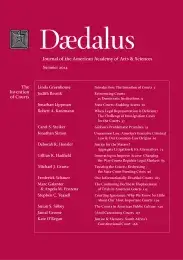Reinventing Courts as Democratic Institutions
Eighteenth-century constitutional commitments guaranteeing rights-to-remedies were shaped when members of the propertied classes were the prototypical litigants and governments' criminal justice systems were nascent. Twentieth-century egalitarian norms expanded the imagination of what justice could produce, and courts turned into sites of democracy. The particular and peculiar practices of adjudication produce, redistribute, and curb power among disputants who disagree in public about the import of legal rights. But new procedures—alternative dispute resolution (ADR)—encourage, and sometimes require, disputants to mediate or to arbitrate disputes privately as a predicate to or in lieu of using the public forum of courts. Some initiatives delegate adjudication to administrative tribunals, and others outsource binding decision-making to private providers. The resulting fragmentation and privatization of adjudication have profound implications for the newly minted democratic character of courts. The durability of courts as active and disciplined sites of public exchange ought not to be taken for granted. Like other venerable institutions of the eighteenth century—such as the postal service and the press, which served in parallel fashion to disseminate information and support democratic competency—courts are vulnerable.
The idea that courts are a modern invention may seem counterintuitive. References to judges and to adjudication abound in classical and biblical sources, and the contemporary landscape is replete with courthouses, often marked by statues of the Renaissance Virtue Justice to differentiate their function from that of other government buildings. Courts seem so obviously central that the novelty of their contemporary incarnation, their social welfare implications, and the fragility of the aspirations that they have come to represent can easily be lost.
Adjudication in democratic polities is remarkably different than the traditions from which it emerged. In ancient times, judges were loyal servants of the state; audience members were passive spectators watching rituals of power; and only certain persons were eligible to participate as disputants, witnesses, and decision-makers. In contrast, today’s judges are independent actors in complex and critical relation- . . .
